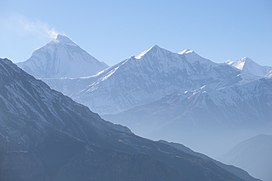Dhaulagiri II
Dhaulagiri II (Nepali: धौलागिरी २) is a mountain in Gandaki Province, Nepal. It is part of the Dhaulagiri mountain range in north-central Nepal at an elevation of 7,751 metres (25,430 ft) and with the prominence of 2,391 metres (7,844 ft).[2] Dhaulagiri II is the second highest mountain in the Dhaulagiri mountain range and it was first climbed by an Austrian-American expedition from its northwest side.
Geography
Dhaulagiri II is located at the border of Chharka Tangsong Rural Municipality, Dolpa, and Dhaulagiri Rural Municipality, Myagdi in Gandaki Province at 7,751 metres (25,430 ft) above sea level and its prominence is 2,391 metres (7,844 ft).[3] It is part of the Dhaulagiri mountain range in north-central Nepal, and Dhaulagiri II is the second highest mountain in the mountain range.[4] The main peak of the mountain range, Dhaulagiri, is the seventh highest mountain in the world at 8,167 metres (26,795 ft) above sea level, and the highest mountain within the borders of a single country.[5]
Climbing history
In 1955, Dhaulagiri II was approached by J. O. M. Roberts and others.[6] In 1963, an Austrian expedition attempted to ascend Dhaulagiri II from Dhaulagiri V which were among the last unclimbed seven-thousanders.[7] However, they only managed to reach 7,000 metres (23,000 ft).[8] Two years later, a Japanese expedition was also unsuccessful due to an avalanche.[9] On 18 May 1971, Dhaulagiri II was first climbed by Adolf Huber, Ronald Fear, Adi Weissensteiner, and Jangbu Sherpa during an Austrian-American expedition via its northwest side.[10][7] On 8 May 1975, the second successful climb was made by ten Japanese men by using a new route from the Tsaurabong Glacier.[11] In 1982, a French expedition led by François Imbert using a new route, however, they abandoned the mountain after reaching 6,800 metres (22,300 ft) on 19 October due to heavy snow which posed a threat for an avalanche.[12]
References
- ^ "Peak Bagger:Himalaya, Central Nepal Himalaya, Khumbu, Ghurka Himal, Annapurna Himal, Xishapangma Area, Sikkim-Eastern Nepal Himalaya, Western Nepal Himalaya, Assam Himalaya, Punjab Himalaya, Bhutan Himalaya, Garwhal Himalaya, Ganesh Himal". Retrieved 22 October 2024.
- ^ "Dhaulagiri II". PeakVisor. Retrieved 2022-01-20.
- ^ "Dhaulagiri II". Nepal Himal Peak Profile. Archived from the original on 2021-12-13. Retrieved 2021-12-13.
- ^ Amatya, Jagdish Man Singh (1970). Pokhara Valley: Trekking in Annapurna-Dhaulagiri Area. Man Kumari Amatya. p. 90.
- ^ Bright, Michael; Matsuura, Koichiro (2017-10-24). 1001 Natural Wonders You Must See Before You Die. Book Sales. p. 703. ISBN 978-0-7858-3583-7.
- ^ "The 1963 Austrian Dhaula Himal Expedition". Himalayan Journal. Archived from the original on 2019-02-23. Retrieved 2021-12-13.
- ^ a b "Dhaulagiri II". AAC Publications. Archived from the original on 2017-03-03. Retrieved 2021-12-13.
- ^ Sujarwo, Anton (2018-11-30). MAHKOTA HIMALAYA: Kecamuk kompetisi para legenda dalam perebutan 14 puncak gunung tersulit di dunia (in Indonesian). Anton Sujarwo. p. 177. ISBN 978-602-0713-06-9.
- ^ "Dhaulagiri II". Himalayan Club. Archived from the original on 2019-02-23. Retrieved 2021-12-13.
- ^ The Alpine Journal. Alpine Club. 1979. p. 30.
- ^ Club, American Alpine (1997-10-31). American Alpine Journal, 1979. The Mountaineers Books. p. 278. ISBN 978-0-930410-75-9.
- ^ Club, American Alpine; Carter, H. Adams (1997-10-31). American Alpine Journal, 1983. The Mountaineers Books. p. 247. ISBN 978-0-930410-21-6.
External links
- Dhaulagiri II at Nepal Himal Peak Profile



